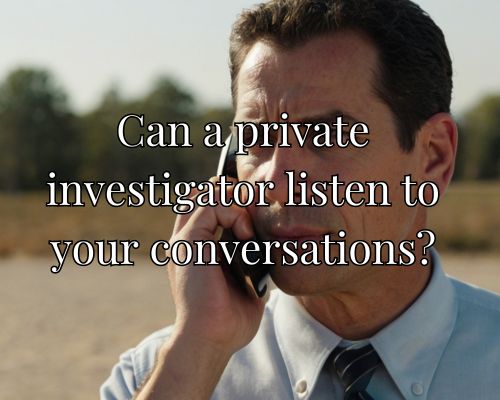Can a Private Investigator Listen to Your Conversations?

Exploring the Legality and Ethics
If you’re concerned about your privacy, you may be wondering if a private investigator can listen to your conversations. The short answer is that it depends on the circumstances.
Private investigators are subject to legal restrictions, and there are limits to what they can and cannot do. Let us know these limits with Sherlock Holmes of Ali Private Investigator Tampa.

First and foremost, it’s important to understand that private investigators are not above the law. They must operate within the bounds of the law, just like everyone else.
This means that they cannot engage in illegal activities, such as wiretapping or eavesdropping on private conversations without proper authorization. If a private investigator were to engage in such activities, they could face serious legal consequences.
However, there are situations in which private investigators may be legally allowed to listen to conversations.
For example, if a conversation takes place in a public space where there is no expectation of privacy, a private investigator may be able to listen in without breaking any laws.
Additionally, if a conversation is recorded with the consent of all parties involved, it may be admissible in court.
It’s important to note that the laws surrounding private investigators and privacy can vary from state to state, so it’s always a good idea to consult with a legal professional if you have concerns.
Legal Framework Governing Private Investigators
Private investigators play a crucial role in gathering information for individuals, attorneys, or corporations. However, they must operate within strict legal boundaries to avoid breaking local or state laws and causing undue harm to the subjects under investigation.
In this section, we will explore the legal framework governing private investigators, including wiretap laws, privacy laws, and the role of consent in conversation recording.
Understanding Wiretap Laws
Wiretapping is the act of intercepting, recording, or monitoring conversations without the consent of at least one party involved in the conversation.
Wiretapping laws vary from state to state, and it is essential to understand the laws in your state before recording any conversations.
In some states, it is illegal to record a conversation without the consent of all parties involved. In other states, only one party needs to consent to the recording.
Private investigators must adhere to wiretapping laws to avoid legal consequences.
Violating wiretapping laws can result in fines, jail time, and even lawsuits. It is crucial to consult with an attorney before recording any conversations to ensure compliance with wiretapping laws.
Privacy Laws and Expectation of Privacy
Privacy laws protect individuals from unreasonable intrusion into their private lives.
Private investigators must respect an individual’s right to privacy and cannot legally record conversations or gather information in areas where there is an expectation of privacy, such as bathrooms or bedrooms.
Additionally, individuals have a reasonable expectation of privacy when it comes to electronic communication.
Private investigators must obtain consent before recording telephone conversations or electronic communication.
The Role of Consent in Conversation Recording
Consent is a critical factor when it comes to recording conversations.
In some states, only one party needs to consent to the recording, while in other states, all parties must consent.
Private investigators must obtain consent before recording conversations to avoid violating wiretapping laws.
It is important to note that consent must be given voluntarily and without coercion. Private investigators cannot use threats or intimidation to obtain consent to record conversations.
Operational Boundaries and Ethical Considerations
Private investigators (PIs) play an essential role in uncovering the truth in various situations. However, their work is grounded in legalities and ethical considerations.
As a licensed private investigator, you must navigate the complex web of legal boundaries while conducting private investigations just like what Ali Private Investigator Tampa does.
Surveillance Techniques and Limitations
Surveillance is a common technique used by private investigators to gather information. However, there are limitations to what you can and cannot do.
As a licensed private investigator, you are only allowed to conduct surveillance in public areas where there is no expectation of privacy. It is illegal to use GPS tracking or bugs to monitor someone’s activities without their consent.
Information Gathering and Use of Technology
Licensed private investigators have access to a wide range of information-gathering tools and technologies. However, you must be careful in your use of these tools.
It is illegal to hack into someone’s phone records or electronic communications. You must also be careful not to use any information obtained through illegal means in your investigations.
Trespassing, Hacking, and Invasion of Privacy
As a licensed private investigator, you must adhere to strict ethical standards and legal guidelines in your pursuit of truth and justice. You must respect people’s privacy and not engage in any illegal activities such as trespassing or hacking.
Using information obtained through illegal means in your investigations is also illegal.
Private investigators play a crucial role in uncovering the truth in various situations. However, they must operate within legal boundaries and ethical considerations. As a licensed private investigator, you must be knowledgeable about these boundaries and limitations to ensure that your investigations are conducted professionally and responsibly.





